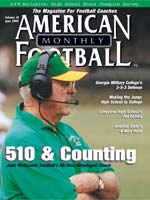AMERICAN FOOTBALL MONTHLY THE #1 RESOURCE FOR FOOTBALL COACHES
Article CategoriesAFM Magazine
|
The Way It Used To BeFootball coaching legends share their experiences on the gridiron before laptops, charter jets and mega-million dollar facilitiesby: Rex Lardner © More from this issue American Football Monthly recently sat down with a few of the game’s greatest coaches for a peek inside the ever-changing world of football. From their first job to their last, their first championship season to their first losing season, AFM has captured it all – coaches provide AFM with an exclusive journey down memory lane. Maybe you can’t walk in their shoes, but perhaps you can at least try them on. So sit back and enjoy the game of football “the way it used to be.” Lou Holtz Spanning a career over five decades, Lou Holtz enters his sixth season with South Carolin....The full article can only be seen by subscribers. Subscribe today!
|
|
|||||||
| HOME |
MAGAZINE |
SUBSCRIBE | ONLINE COLUMNISTS | COACHING VIDEOS |
Copyright 2026, AmericanFootballMonthly.com
All Rights Reserved





